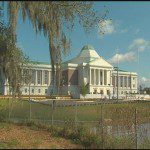Any future court building will have to be approved by the State Courts Administrator, and that office will assign someone to monitor the project, under an order issued Monday by Supreme Court Chief Justice Charles Canady in response to the controversy over the new district appeals court building in Tallahassee.
 Canady issued a terse 2-page order Monday decreeing that no contract can be signed without the approval of the administrator’s office. Canady actually signed the order late last week following a tense meeting in which the court came under criticism from the Legislature for how the 1st District Court of Appeal came to be.
Canady issued a terse 2-page order Monday decreeing that no contract can be signed without the approval of the administrator’s office. Canady actually signed the order late last week following a tense meeting in which the court came under criticism from the Legislature for how the 1st District Court of Appeal came to be.
The new courthouse for the district panel was pushed through by two of the court’s judges, Brad Thomas and Paul Hawkes, who were hauled before legislators to explain how the project came to produce such a large and, to some, lavish building, while the rest of the court system was struggling under dwindling budgets.
Both Thomas and Hawkes apologized, but said that they didn’t think there was anything wrong with their push for the court, or the way it was built.
In addition to monitoring all future building projects, the court administrators will provide updates to the chief justice from time to time. The Supreme Court’s Office of Inspector General will also conduct reviews of district court building projects during planning and construction, Canady ordered.
Canady also provided testimony last week, before the Senate Criminal and Civil Justice Appropriations Subcommittee, and expressed his concern over the nearly $50 million building, in Tallahassee’s Southwood area.
“The Supreme Court of Florida shares the public concern about the implementation of the First DCA building project,” Canady said in remarks that were provided to the committee. “Although operational oversight of … construction projects is necessarily an executive branch function, we understand that when the Legislature appropriates funds for the benefit of the judicial branch, the courts should help ensure that taxpayer money is handled with care. Every dollar spent should be spent wisely and with an unceasing awareness that it is hard-earned taxpayer money.”
The building went more than $15 million over budget. Much of the criticism was over what some said was a lavishness in the appearance of the domed building, and what some critics said were overly expensive and unnecessary fixtures, such as large, flat-screen TVs for judges, and granite counter-tops.
“Courthouses should be dignified, durable and functional,” Canady said in his statement last week. “They should not be grandiose, monumental and luxurious.”
By David Royse
The News Serivce of Florida


